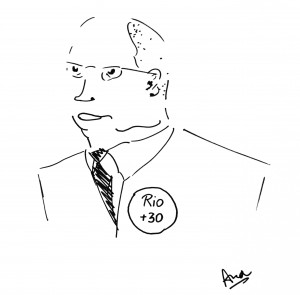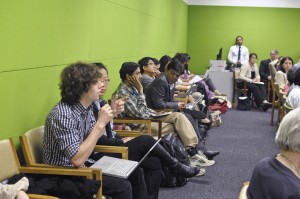by Lara Shirley
1. The demand for a human rights-based approach
In various side-events and negotiations, the concept of a human rights-based approach has come up several times, especially with regard to indigenous peoples, food security, and water.
This is essentially to ensure justice and effectiveness in the agreements that come out of these negotiations, and is particularly relevant within the context of sustainable development. Human rights are essential for reinforcing the social pillar, which can otherwise get lost between the economic and environmental pillars, as they are more easily measurable and less ignorable, although the economic more so.
There was an open letter written by 22 human rights UN experts calling for the document to contain human rights standards in their development goals in order to be successful. For goals to be effectively achieved, there needs to be accountability: for accountability, there needs to be standards, and human rights can be used as those standards.
2. The excuses against a human rights-based approach
Within the UN, human rights are (technically) non-negotiable: they are its cornerstone and one of the initial motives for its creation. Because of this, giving something ‘rights’ in UN carries a lot of weight and often responsibility as well.
Since a human rights-based approach is to help those who don’t already have rights, those that do have them dislike it because they are benefiting from the current situation. Thus, this proposal is unwelcome for most developed countries (excepting the occasional insertion from the Holy See and Liechtenstein).
Developed countries lamely hide behind a few pretenses to avoid acknowledging this. One of the most common excuses is that because the concept of ‘rights’ is apparently vague, the parties discussing it feel uncomfortable committing to something that they don’t know the definition of, and so they replace it with heavily weakened synonyms: ‘universal access’, ‘non-discriminatory access’, or even a paltry ‘commitment to’.
The US is exceptionally adept at dodging the human rights bullet, and during the food security negotiations even stated that a human rights-based approach is irrelevant to a document on sustainable development, because it is being discussed elsewhere.
However, it must be noted that the G77 is not the greatest advocate for human rights either. While they do push for rights to water and food, indigenous rights remain underrepresented. Some developing countries – China being the most obvious example – see human rights as another form of imperialism from the global North, as another excuse to inhibit economic development and impose culture. One issue being wrangled over in negotiations today was development in developing countries – a right that can be hindered by human rights.
3. The moral implications of the framework of a human rights-based approach
What made the strongest impression on me – during all the events, but especially the indigenous peoples’ side-event – was this juxtaposition between indigenous representatives earnestly speaking about respect for and protection of their cultures, and their use of a distinctly Western non-indigenous negotiating tool: the UN Charter of Human Rights. Their aims become somewhat diluted because they are defined by these channels formed by a completely foreign mentality. In order to take action at such a high level, in this kind of organization and interacting with certain kinds of people, it is necessary to slot yourself into a bureaucratic shape in order to be comprehended and perhaps even listened to.
Unfortunately, by doing this you lose meaning: perhaps not technical meaning, but underlying significance. This links into the previous paragraph of China’s tussle between human and development rights: rights seem to morph into a mere trade-off, and human rights become just another negotiating tool to be manipulated back and forth instead a symbolic and unifying message.
This is not to say I am criticizing the indigenous people for going through this system, because they want results and the UN has the potential to give them that. Crechin Gordon, a policy analyst at the Indian Law Resource Center, spoke at the indigenous people’s side event and explained that a human rights-based approach is key. When socioenvironmental impacts are discussed, responsibility is invoked on actors to mitigate those impacts. When human rights are discussed, you invoke a duty to not violate those rights in the first place. With their acknowledgement, their violation has at least a chance of being prevented.
Human rights are another convoluted terrain fraught with implications and are far more difficult to navigate then they first appear. However, unlike many UN constituents, human rights actually have the potential to be politically maneuvered by major groups to make a change for the better. More power to them.




